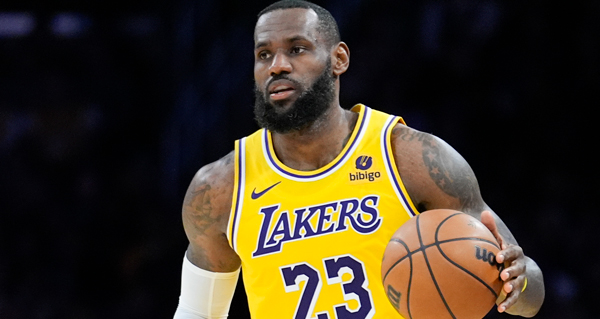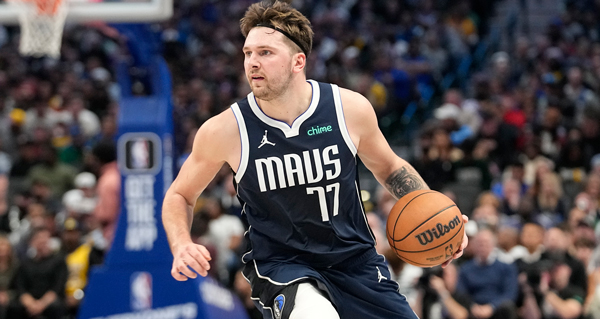After trading Anthony Davis for Luka Doncic, the Los Angeles Lakers are—once again—one of their sport’s glitziest, most premier teams. On paper, Davis and Doncic have similar accomplishments: a few appearances in the top ten of MVP voting, perennial All-NBA and All-Star accolades, a number of deep playoff runs. Doncic has achieved these same things more quickly, however; he’s six years younger. And he has done so with significantly more bombast, playing in his highly stylized, ball-dominant, attention-magnetizing way. He sells lots of jerseys and tickets. Davis does not.
That’s the big problem, from a business perspective, that the Dallas Mavericks now face. Will their team ever be good enough to overcome the hurt they just subjected their fans to, by suddenly and shockingly breaking up with their beloved young star? Clearly, the calculation that ownership and management has made is that forgiveness will one day be possible. Having never attracted big names in free agency, and scared of losing the one that they have—or of not being able to control his lifestyle enough to rely on him, long-term—they looked in the mirror and classified themselves as a Laundry Team. Charismatic show-stoppers are too risky, they concluded. Whoever wears the jersey is who matters.
NBA fandom is, increasingly, less team-centric. Many who rooted for Doncic in Dallas will now root for him in Los Angeles. Lakers' fandom is the biggest tent among the sport’s enthusiasts, and it’s a welcoming one. With or without formerly Mavericks-rooting converts, it just got bigger. A franchise forever invested in star power just got its new billboard guy, and he’s their first front-line superstar from overseas. The big global brand stays that way, while the Mavericks shirk back into the provincial loyalties they hope to regain with Davis and Co.
How will it work on the court, though? In Dallas, Davis’ combination with the team’s other big men will make them one of the best defenses around, and a group uniquely equipped to deal with Nikola Jokic’s Denver Nuggets and the conference-leading Oklahoma City Thunder, this Spring. There is a chance, in a parity-driven season, that cornering the market on front-court brawn will win the day. The offensive challenges will be real, though. Kyrie Irving is of course a dynamo who can always do interestingly productive things, but much of the roster is composed of Luka-dependent role players who have gotten used to their domineering composer. What will they do under the bright lights, without him?
And what kind of composing will Luka do with the Lakers, next to one of the only half-court engineers who can measure up to his own level of masterful control? LeBron James is a 40-year-old who has still barely learned to live without the ball in his hands, though recent seasons have seen him ceding more usage to a resurgent Davis. It’s hard, in any event, to imagine Austin Reaves with much agency, now. He is one of the collateral men in this dramatic shake-up, which also leaves the Lakers with no real front court. That might be addressed before the trade deadline hits on Thursday. Otherwise, Doncic’s arrival seems more geared toward next year, when James will be a year closer to retirement.
The contrast between these two teams, in the wake of their transactional earthquake, shoves us into philosophical questions about how to proceed in the modern NBA. The Mavericks don’t want to be the Philadelphia 76ers, who owe about $250 million to Joel Embiid, a center who might never play 50 games in a season again; or, the Miami Heat, currently paying that rate to Jimmy Butler, who is holding their franchise hostage; or, the Phoenix Suns, mired disappointingly in the play-in tier as they struggle with a multitude of superstar issues. The guys responsible for those teams’ existential woes are all in their thirties; Dallas, with an up-close view of Doncic’s personal habits, saw him as a 25-year-old who’s already about five years further than that in his basketball mortality.
It’s possible, as many have speculated, that Luka learns new ways of being next to LeBron—the best, healthiest, and most influential hooper of the 21st century. But there’s a good chance that this speculative feel-good story is the product of minds that grew up on too many Matt Christopher books. Doncic is set to earn about half a billion dollars whether he changes or not, and James has long demonstrated impatience with teammates who don’t fall into his perfectly calibrated orchestra. This looks a lot more like a dubious handoff of the franchise spotlight than anything else. Leading the Lakers is hard, and as LeBron can attest, the fanbase’s gratitude does not come easily. Unwilling to see Doncic through whatever plagues him, the Mavericks just sent him to a task much harder than the one they’d given him. If he can do it, basketball mythology will have to revise its definition of “forever.”




